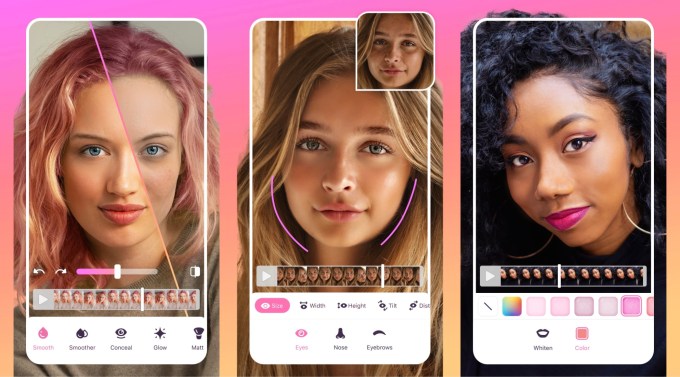Welcome back to This Week in Apps, the TechCrunch series* that recaps the latest OS news, the applications they support and the money that flows through it all.
The app industry is as hot as ever, with a record 204 billion downloads and $120 billion in consumer spending in 2019. People are now spending three hours and 40 minutes per day using apps, rivaling TV. Apps aren’t just a way to pass idle hours — they’re a big business. In 2019, mobile-first companies had a combined $544 billion valuation, 6.5x higher than those without a mobile focus.
In this series, we help you keep up with the latest news from the world of apps, delivered on a weekly basis.
* This Week in Apps was previously available only to Extra Crunch subscribers. We’re now making these reports available to all TechCrunch readers.
This week, we’re focused on rounding up the news from the U.S. antitrust investigation into Apple, as it pertains to apps, the App Store and developers.
Let’s dive in.
Apps and the Antitrust Hearings
Image Credits: TechCrunch
Developers’ concern over Apple’s alleged anti-competitive behavior with regard to how it runs the App Store was one of the many topics that came up during this week’s antitrust hearings. Apple CEO Tim Cook defended the company’s App Store commission structure and treatment of developers in his sworn testimony before the House Antitrust Subcommittee.
But the documents the committee had collected indicate that there were times, in fact, when developers had not all been treated equally, nor did they all have the same terms. Though it’s not surprising, or even unusual, to hear that Apple had carved out special deals for larger companies, the company has continued to insist the App Store is an even playing field for all developers, both large and small. That’s not the case, the documents reveal, as larger companies got deals allowing them to pay less in commission or had access to faster app reviews and dedicated personnel for their needs.
In addition, the documents detail how Apple’s control of the App Store allows it to unilaterally make decisions about app pauses and removals. This impacts large companies, like Spotify, as well as small developers, like those detailed in these emails:
Documents from the US antitrust investigation into Apple by TechCrunch on Scribd
Here are key sections that pertain to Apple & the App Store:
- Apple Cut a Special Deal with Amazon, pp. 34-51; 67-69: Though Apple claims an even playing field for developers, its rules didn’t apply to larger companies. As part of an extensive deal with Amazon over its Prime Video app and Apple device sales on Amazon.com, Amazon agreed to remove “tens of thousands” of unauthorized (not necessarily counterfeit) sellers of Apple products, to give Apple control over its experience on the retail site, among other things. Apple let Amazon pay a 15% commission for in-app sign-ups on Prime Video subscriptions, instead of the 30% apps have to pay during their first year.
- Apple Cut a Special Deal with Baidu, pp. 52-54: Apple also negotiated with Baidu to make it the default search engine in China, and as part of that agreement, offered it access to an “App Review Fast Track,” where Baidu would be allowed to send Apple a beta app for review to speed up the approval process. Apple also assigned two key contacts to work with Baidu. Again, not surprising that a big company got special treatment, but the party line is that all developers are treated equally. Access to faster app reviews is not something accessible to all developers, under certain conditions, or even publicly documented.
- Apple Considered a 40% Commission, pp. 107-109: Apple in 2011 debated raising its commission to 40%. “I think we may be leaving money on the table if we just asked for about 30% of the first year of sub,” one exec said. Tim Cook, in the hearing, said Apple wouldn’t raise commissions because it competed for developer interest, too.
- Requiring Apple’s Apps as the Default, pp. 32-33: Apple, until recently, never allowed iOS users to make a different app from a third-party developer their default app for that task on their device. That means map links open in Apple Maps and Calendar appointments lead to Apple’s Calendar app, and so on. The upcoming iOS 14 release will allow users to change their default browser and email apps, however. The documents indicate Apple was in possession of complaints from users who wanted to be able to personalize their device to their own needs. Today, Apple still has no plans to allow third-party apps to be set as the default for maps, music, voice assistance, messages, reminders, notes and others, which impacts startups and indie developers who make quality products but can’t gain a foothold on iOS/iPadOS.
- Requiring WebKit for all browsers, pp. 55-56: Apple emails discussed Opera’s 2010 plans to submit a browser it claimed was “up to 6 times faster than Safari,” noting that “it is unlikely that this Opera release is using our webkit, which is required.” Opera, a much smaller company than Apple, was hoping to challenge Apple’s control over the browser experience by taking claims to the press — a tactic often used to demonstrate the limits of developers’ rights to distribute apps on iPhone.
- Banning Apps for Spam, pp. 1-5: Apple banned a developer for spamming the App Store, despite the developer’s claim that he was only creating separate apps because of issues with discoverability on the App Store. The developer, which published a series of maps/guides apps, said people could search for a city by name and find the standalone maps app for that city. But they weren’t being directed to the consolidated app that Apple demanded replace the individual ones, for those same searches. The developer said he would much rather use one single app, as that would be easier to maintain, but had built separate ones because of discoverability issues. Internal Apple emails indicate that Apple stopped accepting the developer’s submissions, forcing them to migrate to a consolidated app.
- App Store Fraud, pp. 6-18: The NYT in 2012 reported on issues around fraudulent charges hitting developers’ apps, which had amounted to millions of dollars for at least one developer over the course of a year. Though fraud is a prevalent problem with digital purchases, the developers’ larger complaint was not that fraud occurred — they didn’t blame Apple for that, necessarily — but that Apple was unresponsive to their requests for help. Apple didn’t reply to emails and didn’t offer a dedicated phone line for complaints, they said. Apple’s internal emails indicated the company didn’t believe there was a real issue with fraud. (“We’ve repeatedly answered this question and haven’t yet identified a case where there is an actual issue,” one exec said.) Apple execs also said the issue had to do with developers who had high levels of refunds and the timing of their refunds. The emails indicated that Apple would “intentionally reply with a standard and rather vague response” about how reporting won’t reconcile due to timing differences and noted that “we do not individually investigate each query.” But the company was aware that some developers had issues. “It is unfortunate as the issue is very small as a percentage of our business and impacts a very small percentage of our developers,” Apple said. Of course, at Apple’s scale, anything that happens to a handful of developers will be a “small percentage” of its business. But for developers, it could be their entire business.
- App Store Search Changes, pg. 21; pg. 28: A November 2015 email indicated that App Store Search changes implemented that month made it harder to find some apps. For example a search for keyword “Twitter” never returned the app “Tweetbot for Twitter,” at all, despite the app’s high ranking and general popularity, evidenced by reviews. Meanwhile, an app that hadn’t been updated since 2008 (Tweeter) would appear in the search results. Phil Schiller forwarded the email to Apple execs with a note “FYI.” (TechCrunch had also reported at the time the changes had impacted the rankings of several iPad apps.) Search issues continued in 2017, as another email indicated that the developer’s app wasn’t being returned for critical App Store keyword search terms in the first 100 results, even for an exact keyword match. While Apple may experience technical problems when it makes changes, developers are left with no resource when those changes effectively “disappear” them from the App Store.
- Apple Removes Parental Control Apps, pp. 70-76, 80-87: Tim Cook was directly questioned about Apple’s removal of screen time apps, and responded that the removals were related to those apps’ use of privacy-invading MDM technology. The documents indicate even Apple was concerned about its move to ban the apps, given their removal directly followed the launch of Apple’s own Screen Time solution. “This is quite incriminating. Is it true?” one exec asked after The NYT covered the story (four months after TechCrunch broke the news!). The apps that were banned didn’t all use MDM, we reported. In addition, Apple didn’t offer a pathway to compliance with regard to apps’ off-brand use of MDM until June 2019. In Congress’ stash of emails from impacted developers, one said they spent an additional $30K trying to fix the problem, but was specifically told “we no longer support Parental Control Apps” even though the App Store still had several listed. A number of consumers also complained about how the apps they relied on had disappeared.
- Apple used App Store to Block Large Companies’ Apps, Too, pp. 77-79, 80-98, 97-98, 102-106: Indie developers weren’t the only ones at the mercy of Apple’s control over the App Store. Verizon (Disclosure: TechCrunch’s parent company’s parent), Spotify, T-Mobile, Amazon and Valve (Steam) also had submitted complaints about their apps not being allowed in or being paused, due to terms violations, and being forced to use Apple’s in-app purchases. Spotify, for example, said it had built a special landing page just for compliance with App Store Rules about not directing users to non-App Store purchase mechanisms. But Apple rejected its app updates for sending an email after a trial period to users directing them to upgrade from Spotify’s website. “Apple claimed that Spotify could not communicate with its own customers, inside its own app, about the existence of its own Premium service — even if there was no link, button, or mention of any offer of any kind,” Spotify legal wrote to Apple legal. “Shortly after our meeting in early July, Apple objected to an out-of-app welcome email to free users, claiming that this email violated the App Store Rules because it mentioned the Premium service,” it said. Apple directly competes with Spotify, which has money to pay expensive lawyers. What are indie developers to do when met with similar situations?
Breaking News
Trump administration to order China-based ByteDance to sell TikTok’s U.S. Operations

Image Credit: Costfoto / Barcroft Media (Photo credit should read Costfoto / Barcroft Media via Getty Images
The Trump administration said on Friday it will sign an order directing ByteDance to divest its ownership of the U.S. app, TikTok, if it wants to continue to operate in the U.S., Bloomberg reported. The app’s associations with China have been under increased scrutiny in the U.S., along with other Chinese tech firms. Most recently, the app has been undergoing a national security review for potential risks. After the initial news, reports bubbled up that Microsoft is in talks to buy the Chinese social network
TikTok has become one of the largest apps in the world and is valued at $50 billion, Reuters reported. The company has been looking for alternative options, including a proposal from some investors, like Sequoia and General Atlantic, to transfer majority control to them. TikTok also fielded acquisition offers from other companies and investment firms, the report had said.
In the meantime, TikTok has recently promised to open its algorithm and fund U.S. creators. It also made another key U.S. hire, with Sandie Hawkins, former VP and head of Americas for Adobe’s Advertising Cloud, now GM of global business solutions for both TikTok and its parent ByteDance.
Hoping to capitalize on the chaos, Triller sued TikTok over patent infringement.
Other Headlines

Image credit: Carl Court/Getty Images
- U.S. Travel App Installs Reached 60% of Pre-COVID Levels in June — Sensor Tower reports on trend in travel app installs hinting at recovery. Vacation rental apps Airbnb and VRBO were bright spots.
- Telegram hits out at Apple’s App Store ‘tax’ in latest EU antitrust complaint — Apple’s antitrust woes aren’t limited to the U.S., TC reports. The messaging app maker says Apple has to allow apps to be downloaded outside the App Store, noting that Apple’s 30% commission leads to higher prices for app users.
- Quibi Patent Suit Moves Forward — Variety reported a judge ruled this week that startup Eko’s patent infringement lawsuit against short-form video app Quibi could move forward. The judge, however, dismissed 3 of 9 claims the suit alleged, but left the heart of the suit — that Quibi used trade secrets to build its app and infringes on Eko’s existing patent.
- Tinder Hires Ex-CBS Interactive Boss Jim Lanzone as CEO — The WSJ reported this week Tinder hired Lanzone as CEO, succeeding current Tinder CEO Elie Seidman. The new exec will report to Match Group CEO Shar Dubey, and has the challenge of guiding the company’s flagship app through a pandemic.
- Roblox jumps to over 150M monthly users, will pay out $250M to developers in 2020 — The gaming platform now has more than 150 million MAUs, up from the 115 million it announced in February before the U.S.’s shelter-in-place orders went into effect. The company also said its developer community is on pace to earn more than $250 million in 2020, up from the $110 million they earned last year.
- Facebook Offers Money to Reel In TikTok Creators — The WSJ reported Facebook’s strategy to counter TikTok was to pay creators to use its Instagram platform instead. The potential payments for some would be in the hundreds of thousands of dollars, the report noted.
- Top Mobile Apps See Declines in User Engagement — TC reported on recent data from App Annie, which found that mobile users now have 93 apps on their phone as of the end of 2019, up from 85 apps at the end of 2015. They also now use around 41 apps per month, up from 35 in 2015. Worldwide, daily time spent in apps has grown to 3.1 hours per day in 2019, up from 2.1 hours per day in 2015. But with that growth has also come increased diversity among the top apps, the report found. That means top apps now make up a smaller proportion of consumers’ total time spent in apps, compared with five years ago.
- Amazon revamps its Alexa app to focus on first-party features, more personalization — TC reported on Amazon’s revamp of its Alexa app. The new app aims to offer a more personalized experience, particularly on users’ home screens, and offers more instructions on how and when consumers can use the digital assistant. Notably, the app has moved its third-party skill suggestions off the main screen.
- India bans 47 apps cloning restricted Chinese services — TC reported that India, which last month blocked 59 apps developed by Chinese firms on the grounds that they pose a threat to the nation’s security, has banned an additional 47 apps that were facilitating access to previously banned services, like TikTok.
Funding and M&A
- YC alum Paragon snags $2.5 million seed for low-code app integration platform. Investors include Y Combinator, Village Global, Global Founders Capital, Soma Capital and FundersClub.
- Revolut extends Series D round to $580 million with $80 million in new funding. The fintech startup had raised $500 million led by TCV at a $5.5 billion valuation in February.
- Huuuge Games acquired games studio Double Star, Apptopia reported, citing Gamesindustry.biz. The studio’s top title is the game Bow Land, which has generated $3.7k via in-app purchases this year, the firm said.
- Toppr raises $46 million to scale its online learning platform in India. Toppr is one of the largest online learning startups in India and offers apps for iOS, Android and web.
- Delightree raises $3 million to help franchise business owners simplify their operations. The startup aims to move much of what currently happens through pen-and-paper over to smartphones.
Downloads
Google One

Image Credits: Google
Google introduced a mobile utility for its cloud storage service Google One. The app will automatically back up your phone’s contents, like photos, videos, contacts and calendar events, using the 15 GB of free storage that comes with a Google account.
Facetune Video

Image Credits: TechCrunch
Lightricks, the startup behind a suite of photo and video editing apps — including most notably, selfie editor Facetune 2 — is taking its retouching capabilities to video. Today, the company is launching Facetune Video, a selfie video editing app, that allows users to retouch and edit their selfie and portrait videos using a set of AI-powered tools.
Source: TechCrunch https://ift.tt/2EGB7re


No comments:
Post a Comment